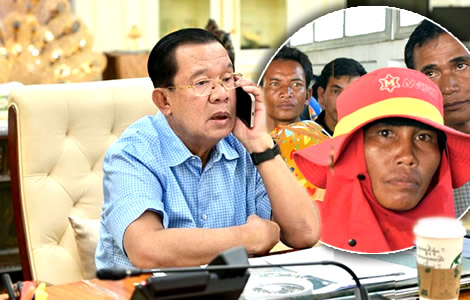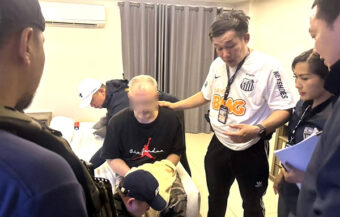Hun Sen’s regime threatens Cambodian workers in Thailand with loss of citizenship and property if they don’t return. After losing 3,000 soldiers in fierce clashes with Thailand, thousands flee home, sparking labour shortages and economic strain across Thai industries.
Since early last week, thousands of Cambodian migrant workers have been fleeing back home. Phnom Penh’s regime flipped its stance and started threatening those who were happy to stay in Thailand. Now, Cambodians still in Thailand risk losing their citizenship—and their property back home. This brutal crackdown exposes Hun Sen’s desperate grab for leverage after losing around 3,000 soldiers in brutal clashes with the Thai military.

A wave of Cambodian workers began returning from Thailand last week. This followed a policy change in Cambodia’s government. Former strongman Hun Sen and his son, Prime Minister Hun Manet, rule the country as a family fiefdom. Previously, they urged Cambodian nationals abroad to come home. Moreover, the government promised soft loans and other incentives. These aimed to help workers reintegrate into Cambodia’s smaller, poorer economy. However, few workers responded at first.
Then, about a week ago, the situation shifted dramatically. Relatives in Cambodia started calling migrant workers in Thailand. These calls carried urgent messages from the Cambodian government.
Specifically, workers were warned to return immediately or face severe consequences. The threats included losing property and land, citizenship revocation and even possible prosecution. Consequently, many Cambodian workers grew fearful. They decided to return home quickly.
Surge of Cambodian workers returning home after Hun Sen’s threats and change of tack last week
These developments expose deeper issues along the Thai-Cambodian border. Despite a 13-point ceasefire agreement from a recent regional meeting, tensions remain high. Meanwhile, Thailand’s 2nd Army announced increased security measures. They plan to install high razor wire fences along the border in Sa Kaeo Province.
This move aims to prevent illegal crossings and frustrate scammer compounds. Additionally, Thailand is cracking down on the online scammer industry based in Cambodia. This crackdown is increasing pressure on Cambodia to act.
On Sunday, Lieutenant General Boonsin Padklang, the commander of the Royal Thai Army in the contested zone, told reporters that Thailand estimates that no less than 3,000 Cambodian troops perished in the clashes between the two countries across up to 17 separate war theatres during what was in effect all-out war for four days. Lieutenant General Boonsin said the cause of Cambodian excess deaths is believed to be because they had deployed heavy levels of armed forces personnel against Royal Thai Army emplacements.
Meanwhile, the mass return of Cambodian workers disrupts many Thai businesses. Construction companies, factories and other industries are especially affected. These businesses rely heavily on Cambodian labourers, known for their skill and reliability.
Despite ceasefire, tensions rise as Thai military tightens border security. Heavy Cambodian troop losses
At a luxury home construction site in Pong Subdistrict, Chonburi Province, contractor Chitipat Chanthong spoke candidly. Dozens of his Cambodian workers left, despite his pleas to stay. He has worked in construction for decades and prefers Cambodian workers for their friendliness and skills.
Mr. Chitipat explained that alarming phone calls from Cambodia sparked the exodus. Relatives warned workers of home and land seizures if they stayed in Thailand.
Furthermore, passports could be confiscated and consular support withdrawn. Rumours also circulated that Thais might harm the workers. As a result, fear and anxiety spread quickly. Almost all of Mr. Chitipat’s Cambodian workers quit, leaving only seven or eight remaining.
He pleaded with Cambodia’s leadership to reconsider the pressure on workers. He also urged Thai officials to help resolve the crisis. According to him, both countries must prioritise their people’s welfare and the economy.
Among the affected workers is Dam, 40 years old, who has worked in Thailand for over five years. He said he fears for his family near the Thai-Cambodian border. The ongoing clashes worry him deeply. Moreover, rumours of land seizures and violence intensify his anxiety. Many coworkers have already returned to Cambodia.
Construction sector hit hard as Cambodian workers flee amid fears of losing homes, land and citizenship
Still, Dam remains at his job for now. His employer asked him to stay and help finish the work. Otherwise, he risks losing his income and cannot repay his debts.
“I borrowed money to build a house,” he said. “Returning home now would ruin me financially.” Despite hardships, Dam hopes for peace between the two countries.
The crisis also hits the tourism sector. At the SR Speedboat Factory in Chonburi Province, owner Sitthikorn Pomthong revealed major problems. Over 80% of his workforce was Cambodian. However, more than half of these workers have returned home since the unrest began. This labour shortage has slowed production and threatens the factory’s survival.
Mr. Sitthikorn said relatives in Cambodia urged workers to return immediately. Village headmen warned that land and citizenship might be lost if workers stayed. Furthermore, false claims warned of Thai assaults and dangerous medical treatments. Despite his assurances of safety, many workers left in fear.
He called on both governments to address the labour crisis urgently. Economic survival depends on the smooth flow of workers across the border. Both Thai and Cambodian leaders must act quickly to stabilise the situation.
Tourism and manufacturing face crisis as Cambodian labour shortage grows after the exodus
Among the few who stayed is Ta, a 34-year-old Cambodian worker at the factory. His friends urged him to return home, but he chose to stay. He trusts his employer and believes the Thai government respects Cambodian workers. To reduce stress, he avoids Cambodian news altogether.
Ta hopes his compatriots will not develop hatred toward Thais. He said, “Thailand is a safe place for Cambodian workers.” He also pleaded for peace and understanding between the two peoples.
At the Ban Khlong Luek border crossing in Sa Kaeo Province, reporters saw at least 500 Cambodians lining up to return home. Many brought their children and grandchildren. When asked, most said relatives called urgently for their return. Some simply wanted to visit family in Cambodia.
Regarding rumours of confiscated property and lost benefits, many workers said they did not know the full facts. They planned to ask their families for details. Some also expressed hope to return to Thailand if the situation improved. After all, jobs in Cambodia are scarce compared to Thailand.
Mixed feelings at border as hundreds of Cambodian workers line up to return amid worrying rumours
The conflict and these rumours deeply unsettle Cambodian migrant workers in Thailand. Many fear losing homes, citizenship, and financial stability. At the same time, Thai businesses lose skilled labour essential for construction and manufacturing. The result is slowed projects and reduced productivity across affected sectors.
Many Cambodian workers remain in Thailand because they cannot afford to leave. Debt and family responsibilities tie them to their jobs. However, the current climate of fear and uncertainty forces many to reconsider. The decision to return home is often heartbreaking but for many, there is no choice.
Thailand is home to at least 300,000 Cambodian migrant workers, with some observers suggesting a far higher number working illegally. The latest official figures from the Ministry of Labour showed 287,557 Cambodian workers registered.
In early July, a Department of Special Investigation (DSI) investigation identified a massive fraud being perpetrated on these workers. The scheme involved government officials in Cambodia. While senior investigators also believe there were suspicious actions associated with the Ministry of the Interior at a high level.
Border tensions worsen as fraud exposed involving Cambodian officials and thousands of migrants
Both Thailand and Cambodia now face an urgent situation. The government is certainly trying to ease border tensions through diplomacy. It has also shown a willingness to protect migrant workers’ rights and livelihoods. Failure to do so risks greater instability in the region.
Finally, the livelihoods of thousands of workers and the economies of both countries hang in the balance. Without swift, cooperative action, the human and economic costs will grow.
On one hand, the government sees the crucial need for leadership to prioritise peace, security and fair treatment of migrant workers. Only then can the border crisis be resolved, allowing people and economies to flourish once more.
Hun Sen expels party official and deputy governor for expressing her concern for starving frontline soldiers
Thai military leaders demand that Hun Sen be held to account as a war criminal for targeting civilians
Cambodia attacks Thailand on another front. The treatment of its migrant workforce, calls for a boycott
DSI cops zero in on senior political official at the Ministry of Labour linked with migrant worker fees
However, on the other hand, the onslaught of missiles and artillery fire from Cambodia from July 24 to July 28 has put Thailand and its population on guard. The focus of the 2nd Army and other military services, which now control the border region, has moved to putting security front and centre.
This tough stance finds increasing support from the civilian population, who were both shocked and outraged by Cambodia’s indiscriminate and deadly attacks on Thailand, which saw 17 civilians killed and 15 soldiers before peace was negotiated through a US, Malaysian and Chinese brokered ceasefire that came into effect on July 29.
Join the Thai News forum, follow Thai Examiner on Facebook here
Receive all our stories as they come out on Telegram here
Follow Thai Examiner here
Further reading:
Prisoner handover pause is the latest move in what is becoming a toxic Thai Cambodian relationship
Information war raging across the world as Thailand combats Cambodia’s propaganda wave in New York
Thailand must certainly speak more boldly and engage foreign media actively to win the information war
Acting PM travels to Kuala Lumpur for ceasefire talks. Cambodia’s PM Hun Manet to attend amid PR war
Hot War rages on the Thai-Cambodian border following Cambodian troops offensive in Chong Bok area


















